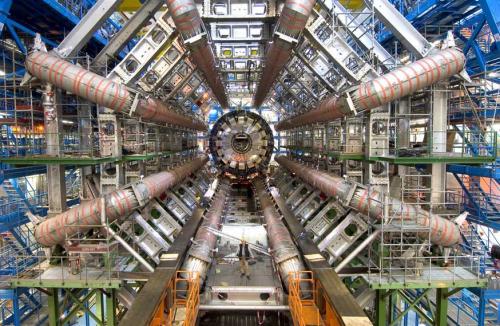Mapping the future of UK particle physics
An update to the European Strategy for particle physics announced will guide UK priorities in the coming years.

ATLAS
STFC CEO John Womersley said:
“This strategy sets clear priorities for European particle Physics, which align well with the UK community's input. We intend to use the strategy to guide not just what happens at CERN but how we set priorities in the UK as well, and STFC's science board is supportive of this approach. The strategy describes a global consensus on the key challenges of particle physics and explains how Europe will focus its activities at CERN on the energy frontier at the LHC (and beyond) while participating in a coordinated way, in two large projects carried out outside Europe – an electron-positron collider in Japan and neutrino experiments in either the USA or Japan.”
CERN Council, including the UK, announced the update to the European Strategy for particle physics at a meeting hosted by the European Commission in Brussels. Europe is updating its Strategy for Particle Physics in order to define the community’s direction for the coming years and to prepare for the long-term future of the field.
“The strategy we have adopted recognizes Europe’s strength in depth in particle physics,” said President of the CERN Council, Agnieszka Zalewska. “Europe’s success is built on strong universities and strong national communities working constructively together and coordinating their efforts through the strong European focal point of CERN.”
One of the key points of the strategy, where the UK has substantial involvement, is to exploit the full potential of the LHC over a period of many years with a series of planned upgrades.
STFC pays the UK contribution to the CERN budget as well as supporting UK participation in the four LHC experimental detector projects, including the Higgs boson detectors ATLAS and CMS. This investment, along with the more than 200 UK nationals employed by CERN and more than 600 UK scientists and engineers regularly working at CERN has been a major contributor in the recent research successes at CERN.
Source: UK Science and Technology Facilities Council
- 371 reads
Human Rights
Fostering a More Humane World: The 28th Eurasian Economic Summi

Conscience, Hope, and Action: Keys to Global Peace and Sustainability

Ringing FOWPAL’s Peace Bell for the World:Nobel Peace Prize Laureates’ Visions and Actions

Protecting the World’s Cultural Diversity for a Sustainable Future

Puppet Show I International Friendship Day 2020

